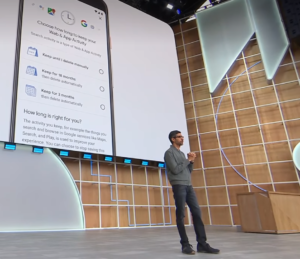Google Phasing Out Third-Party Cookies: What You Should Know

Google has been making waves with its recent announcement on plans to phase out third-party cookie support for Chrome in the next two years.
The news holds some very big implications for marketers and brands that rely on third-party cookies to track and target audiences across the internet. The planned phase-out is the latest signal in a series of privacy moves Google has made to cut down on third-party cookie support for Chrome during recent years.
Here’s how the end of third-party cookie tracking for Chrome will impact advertisers and what they can do to prepare for the change.
“Despite workaround solutions, the momentum between Apples ITP, the rise of ad blocking, and the limitations on data collection and sales, is moving us towards a more private, less intrusive, more fragmented digital ecosystem. Consumers don’t want the status quo digital ad experience. Advertisers don’t want the status quo ad experience (bad creative, viewability, fraud) either.”
 – Jesse Math, VP of Planning & Platforms and OTT Lead at Tinuiti
– Jesse Math, VP of Planning & Platforms and OTT Lead at Tinuiti
In a blog titled “Building a more private web,” Google announced that its Privacy Sandbox and other privacy initiatives will gradually make third-party cookies “obsolete.” “After initial dialogue with the web community, we are confident that with continued iteration and feedback, privacy-preserving and open-standard mechanisms like the Privacy Sandbox can sustain a healthy, ad-supported web in a way that will render third-party cookies obsolete,” writes Justin Schuh, Director of Chrome Engineering.
“Once these approaches have addressed the needs of users, publishers, and advertisers, and we have developed the tools to mitigate workarounds, we plan to phase out support for third-party cookies in Chrome. Our intention is to do this within two years.”

While Google’s announcement is important to be mindful of, it doesn’t necessarily come as a surprise when looking at recent developments on the Chromium blog. In August last year, Google outlined its vision for “building a more private web.”
This vision includes initiatives for addressing the growing privacy needs for users by curbing undesired practices such as “fingerprinting” while also providing new ways for advertisers to deliver relevant ad experiences without third-party cookies.
“Over the last couple of weeks, we’ve started sharing our preliminary ideas for a Privacy Sandbox – a secure environment for personalization that also protects user privacy,” writes Schuh.
“Some ideas include new approaches to ensure that ads continue to be relevant for users, but user data shared with websites and advertisers would be minimized by anonymously aggregating user information, and keeping much more user information on-device only.”
“Google derives most of its revenue from advertising so it would not be surprising to watch them walk this delicate line of increasing privacy protections at scale while still making it possible for advertisers to target their audiences via RTB, i.e. how they currently operate with YouTube and Gmail.”

– Geoffrey Litwer, Vice President, Display & Programmatic Media at Tinuiti
“The Safari and Firefox updates have led ad tech to develop workaround solutions. The more ‘obstacles’ that are put in place, the less sustainable the existing workarounds become. The previous updates have hampered third-party data platforms such as Criteo.”
 – Jesse Math, VP of Planning & Platforms and OTT Lead at Tinuiti
– Jesse Math, VP of Planning & Platforms and OTT Lead at Tinuiti
“While there are already cookie-less tracking solutions in place for some platforms (and some that rely on multiple methodologies), they are generally all server-side. Additionally, some platforms specialize in event-based tracking, often coupled with CDP products (Tealium, Segment, Amplitude are all competitive in the space). The landscape is going to change before they actually make the switch.”
 – Tom Clinton, Manager of Analytics Engineering at Tinuiti
– Tom Clinton, Manager of Analytics Engineering at Tinuiti
“Developing and implementing some of these solutions are not trivial – server-side and cookie-less tracking can require significant development in many cases, which Tinuiti can strategically advise. They will also vary pretty widely based on the platform.”
“Marketing companies that rely on third-party pixels nowadays are going to need to spark up conversations with the partners they work with (think Facebook, Criteo, Snapchat, etc.) about how those marketing publishers plan on or suggest to attack this. It’s two years away so there is a lot that can change in the privacy landscape in that time, but it’s best to be prepared and start thinking about it now. Brands without tagging and dev resources will be in bad shape if they don’t plan server-side tracking accordingly.”

Andrew Richardson, Vice President of Analytics and Marketing Science at Tinuiti
“Brands and digital buyers will need to shift from targeting specific (3P) audiences to being able to leverage machine learning and AI technology to better predict outcomes based on available signals and data. Publishers will need to continue to step-up their first-party data game to increase the value of their audience to buyers. The importance of context and how it can be used as a signal to understand intent or journey will continue to grow.”

– Geoffrey Litwer, Vice President, Display & Programmatic Media at Tinuiti
“While data is still at the core, targeting is moving away from one-to-one to one-to-many. Experiences like Digital OOH, OTT, contextual display, influencers, and podcasts are increasingly becoming part of the media mix (programmatically, nonetheless) because they create viewable, impactful ad experiences that reach concentrations of niche, targeted audiences.”

– Jesse Math, VP of Planning & Platforms and OTT Lead at Tinuiti
Want to learn more?
Google’s Cookie Blocking Extension: What You Should Know
Chromium Blog: Building a more private web: A path towards making third party cookies obsolete
